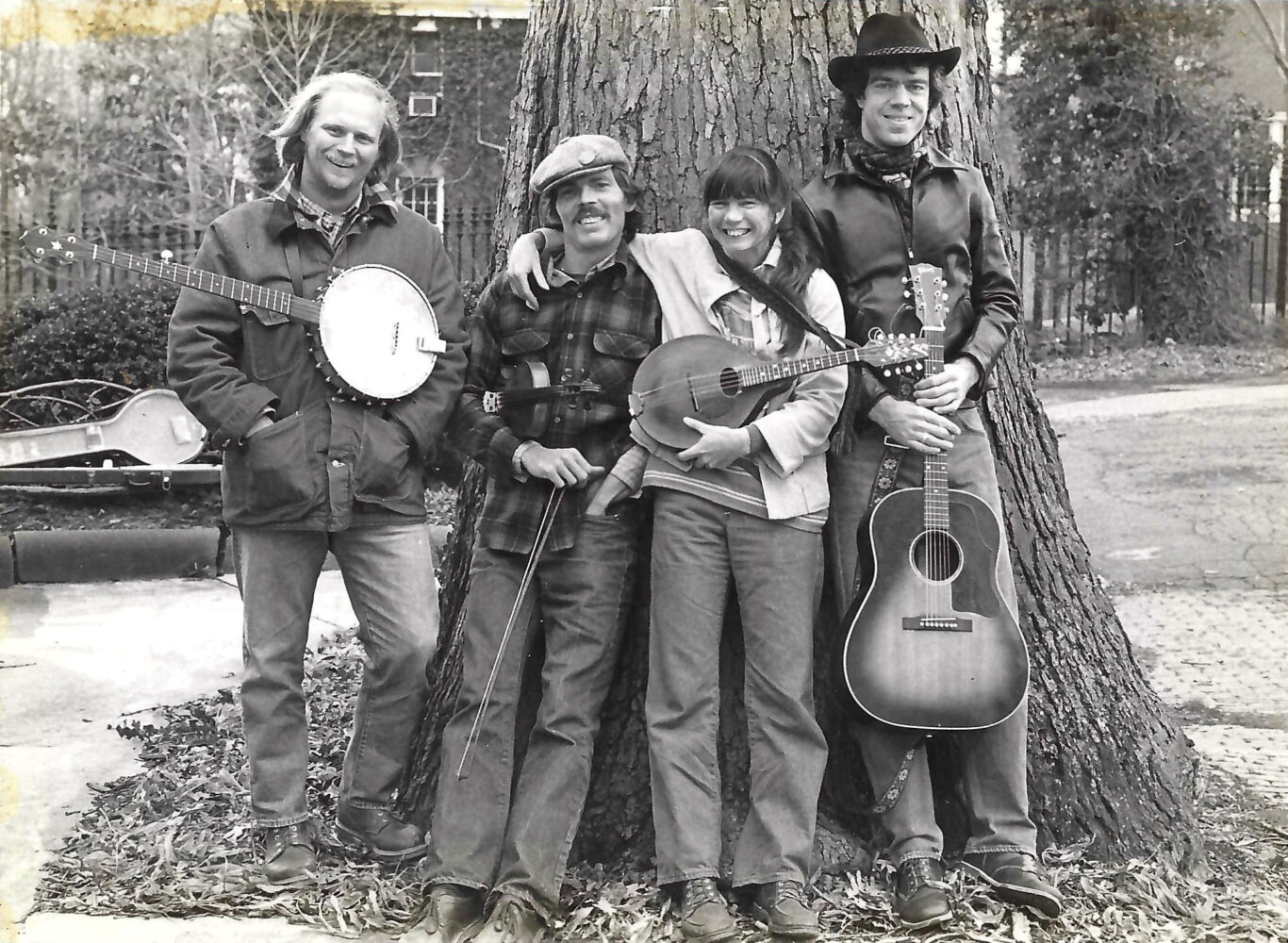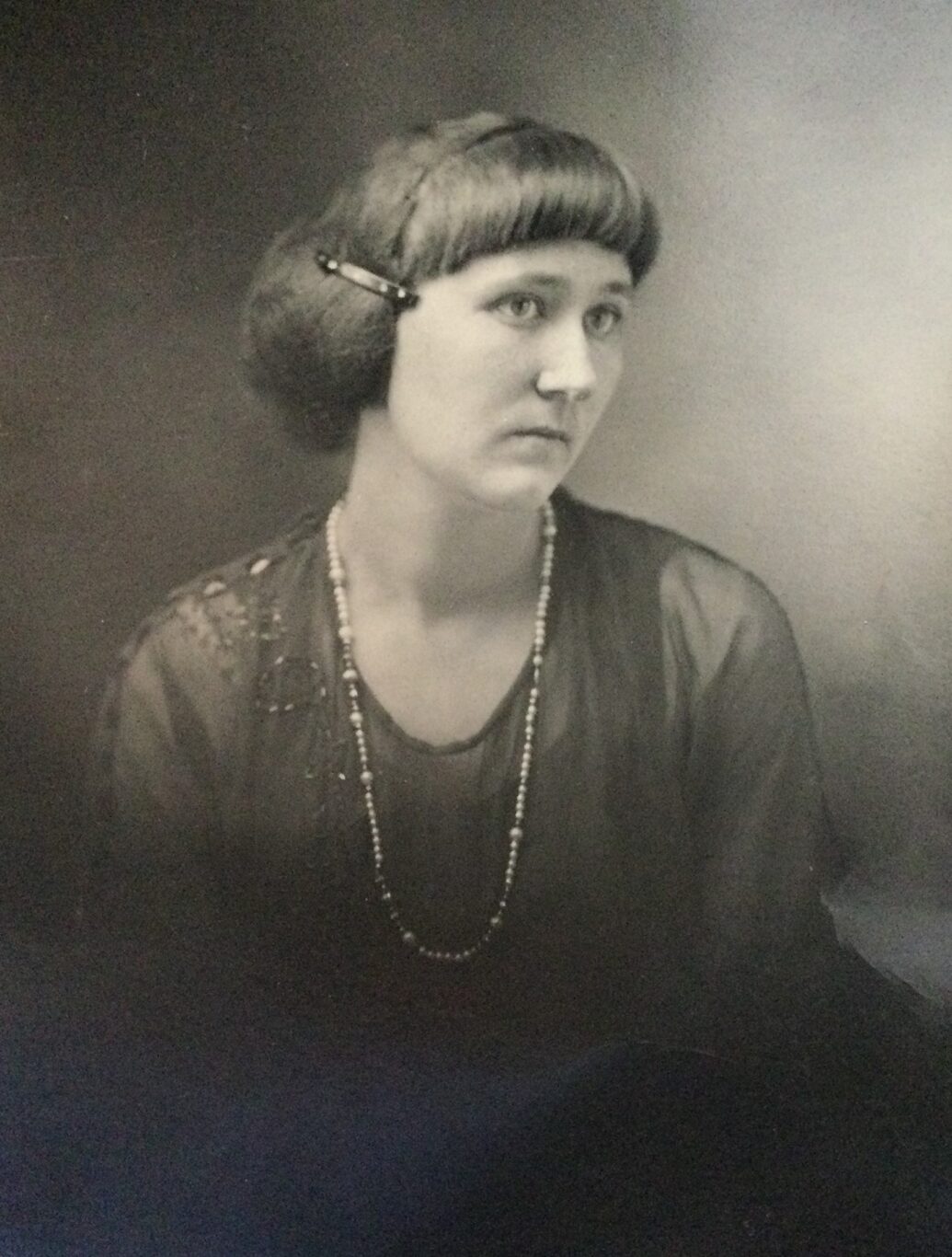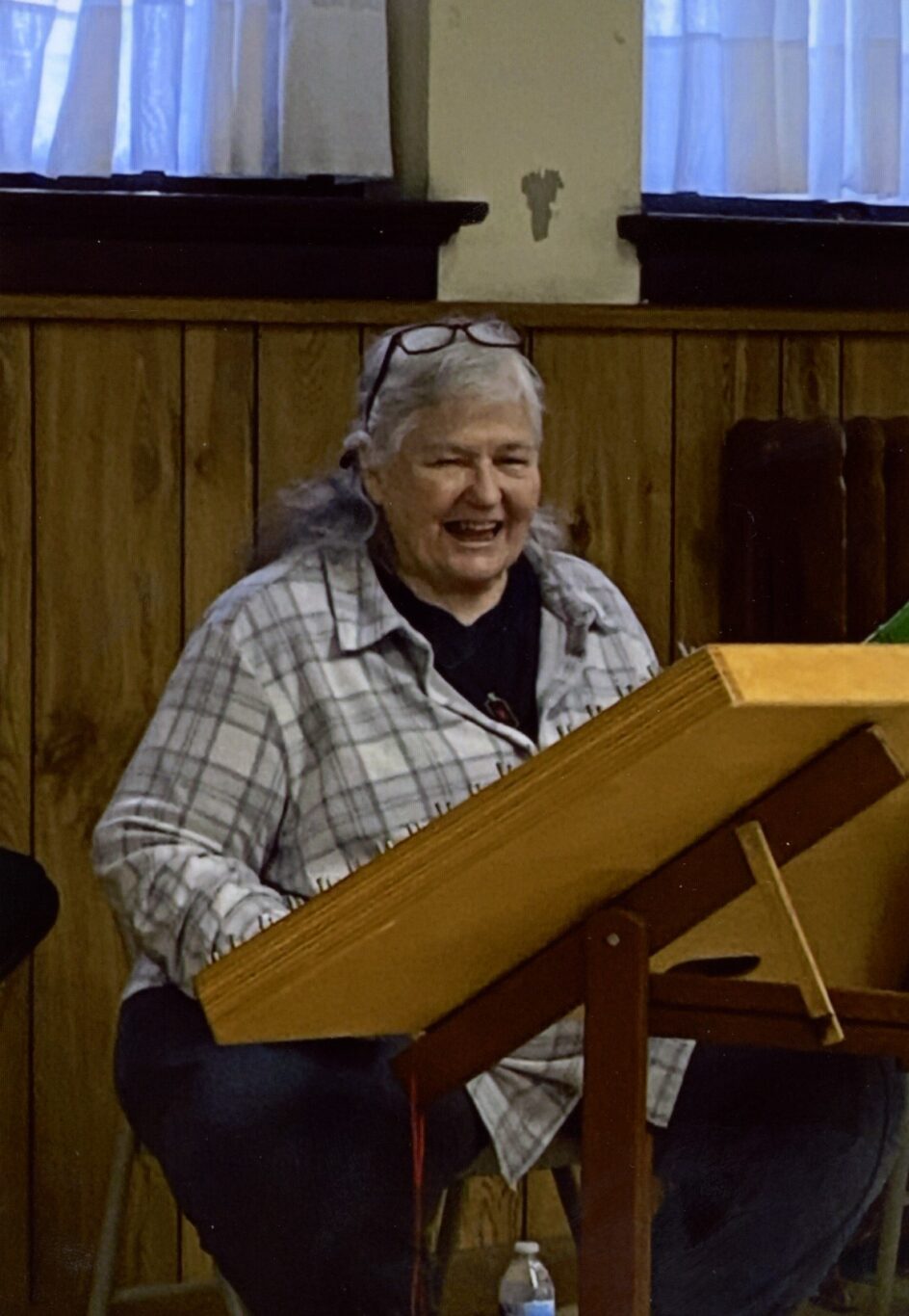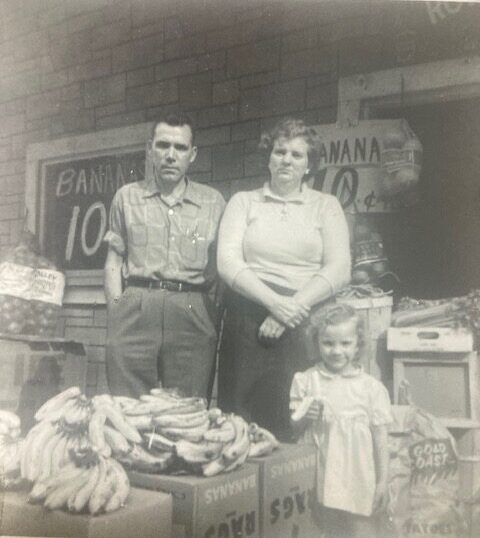By Laiken Blankenship
I sat down on a blustery day in February to chat with Ginny Hawker, the 2024 recipient of the Vandalia Award, our state’s highest folklife honor. Born in Southern Virginia, Ginny is known for her singing, particularly for her Primitive Baptist roots. “My grandfather was [Primitive Baptist], grandfather and grandmother, on my dad’s side. So Daddy usually went to that church, every chance that he got. There are pivotal things that happen [in life] and that church is a pivotal one, you know, for Daddy and for me. Just the way things went at the church—how people were with each other. No one was yelling. No one was shaming anybody. I asked Grandpa one time, ‘How do you know when somebody wants to join?’ And he said, ‘It’s usually the fellow in the back that’s squirming a lot,’” she laughs, “but nobody asked anybody else to join. He always said no one should ever presume to speak to the spiritual life of another.
“So, he never asked us to go to church with him. I mean, we figured that’s where he was going. But Daddy went, and me you know, I wanted to tag along because I wanted to hear that singing. It was so different. It almost puts you in a trance, and when you’re a little kid, you know, you’re seven or eight years old, it’s just so different from anything you’ve heard. No musical instruments in there, just these people singing this slow rolling stuff. And so much from the heart, it was, you could tell it was part of the worship. They weren’t singing it to perform it. There was no choir. There wasn’t anybody leading. Somebody would just say, ‘365, please.’ and, somebody would start off. I don’t know how they ever got their pitch, but they just did, you know. But you sang with no harmony, so you sang in whatever register you could get in. It’s always all unison, but when they move along so slow like that, you kind of hear harmonics. It’s really weird how you don’t miss the harmony—and I love harmony singing. I love it, and so did Daddy.
You can plainly tell when speaking with Ginny how much she loved her father, and just how big an impact his musical influence had on her life. “Daddy might not have known the musical terms to use for music, he probably didn’t know much more than the definition of the word note—but, you know, he taught himself so much,” Ginny shares. Bluegrass was growing popular at that time, and school shows were a common community event. It was from these traveling performances that her father, Ben Hawker, got his first introduction to harmony singing. He was astounded by the singer’s abilities to seamlessly find their part without sheet music, or any external cues he could see. Eventually he figured out by trial-and-error with his brothers, how to sing all parts. “By the time Daddy graduated from high school, the Hawker Brothers were singing all the parts, all four parts, on WBTM radio every Saturday morning,” Ginny shares.

“I just thought, that’s exactly it. That’s it. When the music is so woven in that it’s not set aside here for ‘singers’ or something, you know, people all just singing and—I like that. So this is my home, you know, this is where I want to stay.”
“When he would teach Carolyn, my sister who was two years younger than me, and me, he would say, ‘Carolyn, sing a little higher.’ I don’t know how Carolyn and I knew what ‘sing a little higher’ was, or, ‘you’re too far apart, sing a little closer,” she laughs, continuing, “that was kind of the way we learned, and I still try to do that sometimes when I’m teaching harmony singing.
“Of course, when we moved away from the Danville, Virginia area, there weren’t any Primitive Baptist churches over on the Eastern Shore of Virginia. When I was six, he moved us over there for his work. And, every chance we got, it was back over to Grandpa’s house, —summer’s at Grandpa’s house, you know, Christmas, Thanksgiving—everything was at Grandpa’s house. You’d just cross the Chesapeake Bay and, ride the ferry—which was not fun,” she adds before continuing, “That was my childhood growing up on the Eastern Shore, just inland from Chincoteague Island. From 6 to 18, when I went to college, that was where I lived.” Though Ginny spent the majority of her childhood on the Eastern Shore, she never quite felt at home, and deep down was always searching for the place she felt she belonged.
The American Folk Music Revival was still going strong in the mid-to-late 70s, and Ginny found herself traveling from festival to festival, always seeking the music that sounded like home. “I was living and working in Westminster, Maryland, and started going to the festivals, mostly bluegrass festivals, and then we came to the festival in Glenville.” she says. The West Virginia State Folk Festival (affectionately referred to simply as “Glenville” by regular attendees) has been taking place in Glenville, of Gilmer County, since 1950. “This was in 1977,” Ginny says, “Just the whole lifestyle thing was so evident on the street, and not just the music, but all parts of it. And I thought, ‘Whoa, wait a minute, this is different.’ Glenville was different. It was not, you know, Watermelon Park and all these big crowds, but there were people there that I didn’t even know people lived like that anymore. People were making apple butter. These were things that my aunts and uncles did, but I thought were gone. People don’t live like that anymore, right? I watched the square dancing and just the welcome they had for me, and I thought, ‘I’m not going back.’ I definitely had found my place, you know, particularly with the Folk Festival, and so I just stayed.



“I wanted to be part of that Folk Festival, and do whatever I could, so I went to the first meeting, and I didn’t say anything. I just listened to Mack Samples running the show, which he did, and it was fine with me. I didn’t want to change anything or fix anything. I just wanted to know what it was about.” Slowly, Ginny became more involved with the Festival. “I started to sing at the Festival a little bit on the street and at the jams, and one old fellow came up and said, ‘Girly, the fiddlers come from Clay County here, and the dancers come from Braxton County, but you moved to the right place because the singers come from Gilmer County.’ I don’t remember who that old fellow was, but I just thought that was so neat. I must have landed in the right place, you know. My kids loved it, and they’d come out every summer and spend summers, everybody loved it… that was how I kind of got here [to West Virginia], it was the Folk Festival that held me.”
Ginny went on to serve as president of the West Virginia State Folk Festival from 1995-2005, and still takes part in the festival every year. “I just like the way music in Gilmer County and at the Folk Festival wasn’t something practiced to perform. It was just an integral part of life, just what you did while you were doing other things. I had Reverend Rita [pronounced Ryda] Emerson there who was born and raised in Gilmer County. She could tell you which ballads came from her Scottish mother, and which from her English father. Sharp as a tack, and hearing not the least bit diminished. Rita could hear grass grow. It was uneasy to be around her, a person that age that could hear so well,” Ginny laughs, “but when I had her here [in Elkins], I had started coming to Augusta by that time, somebody in the audience said, ‘Rita, so now where did your family sing these songs?’ And I knew what they meant. They meant, where did you perform? And she thought for a minute and said, ‘Let’s see, hanging up clothes, fixing beans…’ She’s thinking of all the places where they sang, you know, and ‘sometimes in church, but the old ballads, they wouldn’t ever do those in church, sometimes a covered dish dinner if people were sitting around somewhere.’
“I just thought, that’s exactly it. That’s it. When the music is so woven in that it’s not set aside here for ‘singers’ or something, you know, people all just singing and, I like that. So this is my home, you know, this is where I want to stay.”


The Augusta Heritage Center is a non-profit organization which focuses on the study and practice of traditional arts in music, dance, craft, and folklore since 1973. Ginny shares how she became involved with the organization. “I came over here to Augusta, because I’d heard a recording of Hazel Dickens. The depth of her voice was so much like the singing in the Primitive Baptist Church, and there again, it was like it was with the Folk Festival—I didn’t know there was a voice like that left… and when I found out she was going to be here—oh my gosh, yes! So, I came over [from Gilmer County] and when I got here I didn’t know anybody, didn’t know where you go to eat, you know, I had a little room downtown in somebody’s house, I didn’t know that that first year you should stay where everybody else is staying. Well, you know, Sunday, Monday, I kept hearing, ‘Boy, that was fun last night, Hazel,’ in classes and everything, and I was thinking—’what happened, what happened?’ I didn’t know about jams, I didn’t know that you need to stay on campus till midnight, you know, because great things happened then.
“I guess it was Tuesday, and Hazel and I were walking to class, somehow or other in the conversation or the class she found out that I was raised Primitive Baptist, and so was she. We got caught in a rainstorm walking to class, and we ducked beside the building there on campus, and she said—Hazel was so easy to talk to, people, total strangers—she said, ‘So are you having fun here this week?’ and I said, ‘Not really, I don’t think I belong. I’m thinking about going home tonight.’ and she said, ‘No, no, no, don’t go home, listen—they came here to study what you grew up with, just stick with me.’
“You know, when your living idol tells you ‘Just stick with me,’ I didn’t know, I didn’t have any idea what that meant, but, you know, I thought, ‘Well, I’ll hang out here and kind of see what ‘stick with me’ means.’ So it was that kind of shyness, because I was just so knocked out by her singing, and you know, her person. Over the years we had opportunities to sing together, and Rounder heard us at one of those big Folk Alliance Conferences. The head of Rounder Records, rode with me up in the elevator and said, ‘Did you ever think about recording with Hazel Dickens?’ I said, ‘Not in a million years, I never ever considered that.” and he said, ‘Well, I’m going to give you a call, because I think you all’s voices would be good together’… and we were able to do a recording. We needed one high voice, and Carol Elizabeth Jones certainly put that in there. So anyway, we did finally get it out there, and I’m very proud of that recording.” That recording is “Heart of a Singer” released by Rounder Records in 1998. “I do treasure that relationship with Hazel,” Ginny continues, “You know, actually roomed with her and spent the night at other Folk Alliance Conferences. She was a rare person indeed, a rare person.”



Ginny’s friendship with Hazel Dickens blossomed, but so too did her opportunities to share the music of her upbringing with others. “I came that one time [to Augusta] to hear Hazel and realized, wait a minute, these people need to hear my dad. You know, they need to hear another Primitive Baptist voice, so I wrote a letter and sent a cassette recording to Margo Blevin, who was heading up Augusta at that time, and said, ‘This is my dad, he’s 75 now, and people need to hear him, and to hear his story. He grew up on a tobacco farm, you know, a sharecropper, he only went to the third grade, but he’s so smart, he can figure things out. He’ll be a delightful teacher because he relates so well to people, in crowds and one-on-one.’ and I said, ‘but I don’t think he’ll come across the state and everything without me, so, you know, I think the two of us would be really good’ and she fell for it,” Ginny laughs. “That was how Margo built Augusta, by not closing doors, but just saying, ‘oh, that sounds interesting.’ Daddy and I taught together, probably eight or ten years. When he came down the mountain into Elkins, he said, ‘I had a feeling that my life was never going to be the same after this,’ after Augusta, and he was sure right.”
Ginny was surprised to learn over the years through workshops and performances that people were interested not only in the music she taught, but the culture and stories behind the music. “Whenever I teach any class, harmony singing, country music, you know, that old classic country music, you don’t just teach a person a song, they can learn that sitting at home, listening to CDs, you know, and going over, and over, and then learn it. What makes a difference is to me, what made a difference when I first started coming to Augusta as a student was I wanted to hear the stories. One of the best classes ever at Augusta was a songwriting class that had Hazel Dickens, Jean Ritchie, and Nimrod Workman and they would tell the story first of how this song they were getting ready to sing came into their lives; tell that first, and then sing the song. It was so touching to hear why Hazel wrote Black Lung, and her family, you know, telling us about her brother, and other people who got this horrible problem, so I do just that when I teach. I can break it down, I can make them go over line by line, you know—and we do that, I do that when I’m teaching, but, particularly if you have them for a week at Augusta—they’re going to get songs with stories, songs with background. I just think it makes the song, it changes the way the student sings. I try to do that, to find the core of the song, the emotional core of the song.”

Ginny has helped many folks find their voice and singing confidence over the years. She has performed and shared Primitive Baptist songs, as well as old-time, country, and bluegrass across the country and globe. She’s got a lot of great memories and stories and a fondness for her students. She is particularly excited about what the upcoming year will bring. She is participating in the 2024-2025 West Virginia Folklife Apprenticeship program with musician and singer Mary Linscheid. “Mary Linscheid and I, we met due to Dr. Travis Stimeling in 2021, I think it was, when she was still in college at WVU. It just saved my life to know that I was going to have her on my computer every Thursday [during the isolation of the Pandemic]. She’s just a dear soul to me, and it just worked so well. We kind of came at singing through Primitive Baptist singing, and whoa, I couldn’t believe how fast she picked it up. She’s really good. I think it was all those years of classical violin that she had, she listens to little tiny things, she catches the finesse of a song or a tune or something, because she had to do it, I guess, with the violin lessons. She was by far the best student I’ve ever had. I have had all these years of teaching, but we didn’t get too deep into Primitive Baptist stuff, so that’s what we’re doing with the apprenticeship. We’re going to go to the churches, if we can find them. We know of one that’s in Clay County, because I’ve been to that one a couple of times. That’s what Mary and I are going to do, we’re going to go to the churches that we can find, and if we can find somebody that is open to doing it, ask a singer if Mary and I could come over. I’m excited about doing it with Mary, you know, taking little day trips here and there.” Through this apprenticeship Ginny and Mary will be joining together to dig deep into the roots of the music, and ensure it remains to be passed on to future generations.

LAIKEN BLANKENSHIP
Blankenship, Laiken. “The Story Within the Song: Ginny Hawker, Vandalia Award Recipient .” Goldenseal West Virginia Traditional Life, Spring 2025. https://goldenseal.wvculture.org/the-story-within-the-song-ginny-hawker-vandalia-award-recipient/




